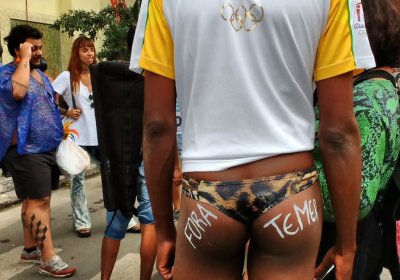 Rafaela Silva.
There is joy in Olympic Rio, make no mistake about it. Maybe it takes two hours to travel 25 miles across the city; and maybe only 15% of the Olympic decorations were delivered; and maybe there are more soldiers on the ground, per capita, than the United States had in Iraq at the height of Bush’s war; but there is joy.
Rafaela Silva.
There is joy in Olympic Rio, make no mistake about it. Maybe it takes two hours to travel 25 miles across the city; and maybe only 15% of the Olympic decorations were delivered; and maybe there are more soldiers on the ground, per capita, than the United States had in Iraq at the height of Bush’s war; but there is joy.
Rio 2016
 Rafaela Silva.
There is joy in Olympic Rio, make no mistake about it. Maybe it takes two hours to travel 25 miles across the city; and maybe only 15% of the Olympic decorations were delivered; and maybe there are more soldiers on the ground, per capita, than the United States had in Iraq at the height of Bush’s war; but there is joy.
Rafaela Silva.
There is joy in Olympic Rio, make no mistake about it. Maybe it takes two hours to travel 25 miles across the city; and maybe only 15% of the Olympic decorations were delivered; and maybe there are more soldiers on the ground, per capita, than the United States had in Iraq at the height of Bush’s war; but there is joy.
 The US’s first Black swimmer to win a gold medal, Simone Manuel, dedicated her win to ending police brutality on August 11. Manuel tied with Penny Oleksiak from Canada at 52:70 to win gold in the 100 metre freestyle race at the Rio games that day.
The US’s first Black swimmer to win a gold medal, Simone Manuel, dedicated her win to ending police brutality on August 11. Manuel tied with Penny Oleksiak from Canada at 52:70 to win gold in the 100 metre freestyle race at the Rio games that day.
Thousands of people from social and political movements in Rio de Janeiro continued to protest against the interim president of Brazil Michel Temer during the second day of the Rio 2016 Olympic Games.
An estimated 30,000 protesters gathered around the Maracana Stadium on August 5, where the opening ceremony of the games took place, but were met by security forces who managed to stop them from entering the stadium.
 Brazil has been hit by anti-government protests in the lead-up to the Rio Games.
When the 2016 Olympic Games began on August 5, it was the culmination of a harrowing, exhausting decade-long battle between the people of Brazil and the demands of those utterly unaccountable, scandal-plagued sports bodies, FIFA and the IOC.
Brazil has been hit by anti-government protests in the lead-up to the Rio Games.
When the 2016 Olympic Games began on August 5, it was the culmination of a harrowing, exhausting decade-long battle between the people of Brazil and the demands of those utterly unaccountable, scandal-plagued sports bodies, FIFA and the IOC.
 Palestinian swimmer Mary al-Atrash.
Palestinian swimmer Mary al-Atrash headed to the Rio 2016 Olympics despite the Israeli occupation making the West Bank-based athlete’s training extremely difficult.
Palestinian swimmer Mary al-Atrash.
Palestinian swimmer Mary al-Atrash headed to the Rio 2016 Olympics despite the Israeli occupation making the West Bank-based athlete’s training extremely difficult.
